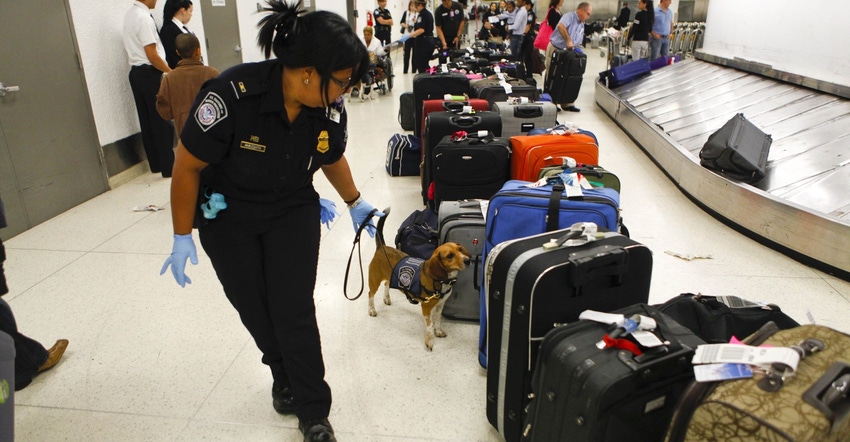Keeping foreign animal diseases far away critical
Risk for ASF incursion into U.S. smuggled pork in luggage has recently increased by almost 200%.
April 13, 2021

Diseases may affect swine health and production in multiple ways. While the impact of some diseases is quite evident, such as abortion or death, the effects of other diseases are more subtle, such as reducing appetite. A reduced appetite may be difficult to observe but in turn will reduce the conversion rates of feed into weight, increasing the time it takes to bring a fat hog to marketing. The effect of some diseases is even more complex. For example, for a number of diseases, countries have agreed to impose specific restrictions to products coming from regions affected by those diseases. Thanks to the efforts of producers, practitioners, and government officers over decades, the U.S. is free from the most important diseases that cause an impact to trade. Taking advantage of such a privileged situation, approximately 25% of U.S. pork production is exported.
Over the last 10 years, the U.S. has been the top pork exporting country in the world by shipping products to more than 100 countries while being the globe’s lowest cost producer of pork. Exports add significantly to the bottom line of all U.S. pork producers. In fact, exports added more than $51 to the value of each hog marketed in 2018 when $6.39 billion of U.S. pork was exported. However, there has been an unprecedented spread of animal diseases globally in the past 10-15 years, which could threaten the U.S.’s role as a pork exporter.
Since 2007, African Swine Fever (ASF) has spread through Asia and Europe, resulting in major losses to the global pig population. China reported a 40% decrease in pig inventory and near doubling of pork prices during 2019, the first year of their ASF epidemic. ASF spread has resulted in significant disruption of the international market, with many countries imposing restrictions to trade from affected regions.
While the U.S. has remained ASF-free, the risk has greatly increased. Scientific research conducted at the University of Minnesota Center for Animal Health and Food Safety (CAHFS) has estimated that the risk for an ASF incursion into the U.S. through pork smuggled in air passenger luggage has recently increased by almost 200% compared to earlier estimates. For the last three years, CAHFS has partnered with the Swine Health Information Center (SHIC) to monitor the spread of diseases that may cause a direct or indirect impact to the U.S. swine industry. Monthly reports produced and shared with relevant stakeholders to help increase awareness and preparedness are freely accessible here.
Finally, CAHFS is partnering with the USDA Animal and Plant Health Inspection Service (APHIS) Center for Epidemiology and Animal Health (CEAH) in Fort Collins, Colo., to design effective and efficient early detection strategies, with the ultimate objective of preventing or mitigating the impact of hypothetical incursions on production and trade. High impact diseases can be first introduced into and spread within our national herd in multiple ways, including visitors, contaminated vehicles, animal feed, human food products, insects, or rodents.
Be observant and communicate to your veterinarian any sign of disease, and most importantly, any unusual animal behavior. If you see something, say something. The competitive advantage that our country currently has for market pork, compared to other big players, can only be maintained if we work together and remain vigilant. Together we are stronger, and the farther we can keep these foreign animal diseases from our borders and animals, the safer we will be.
Sources: Andres Perez, Rachel Schambow, Marta Remmenga, University of Minnesota Center for Animal Health and Food Safety, USDA APHIS, who are solely responsible for the information provided, and wholly own the information. Informa Business Media and all its subsidiaries are not responsible for any of the content contained in this information asset.
You May Also Like



